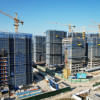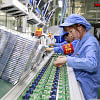China inflation hits nine-month low in December

China narrowly avoided slipping into deflation in December with prices rising at their slowest pace in nine months, official figures showed Thursday, as Beijing struggles to kickstart consumer activity in the world's number two economy.
The tepid reading comes after the government unveiled a range of measures at the end of last year aimed at boosting consumption as well as providing support for the troubled property sector, including interest rate cuts.
However, data showed that has not yet filtered through, with the consumer price index (CPI), a key measure of inflation, easing to 0.1 percent last month, from 0.2 percent in November, according to the National Bureau of Statistics (NBS). The reading is the lowest since March.
A survey of economists had forecast 0.1 percent.
For the whole of 2024 prices were up 0.2 percent, the same as the previous year.
Sluggish spending -- combined with persistent woes in the property sector and local government financing strains -- has cast doubt on the feasibility of official growth targets.
China emerged from a four-month period of deflation in February, a month after suffering the sharpest fall in prices for 14 years.
While deflation suggests the cost of goods is falling, it poses a threat to the broader economy as consumers tend to postpone purchases under such conditions, hoping for further reductions.
A lack of demand can then force companies to cut production, freeze hiring or lay off workers, while potentially also having to discount existing stocks -- dampening profitability even as costs remain the same.
"Recent economic data stabilised but the momentum is not strong enough to generate upward pressure on consumer prices yet," Zhiwei Zhang, chief economist at Pinpoint Asset Management, said in a note.
"The deflationary pressure is persistent," he said.
Low inflation may lead to an increase of real interest rates, said Yue Su, Principal Economist at The Economist Intelligence Unit.
"So monetary easing policy needs to be more proactive to really reduce the borrowing cost of enterprises, which is important for a broad recovery of the economy," she told AFP.
President Xi Jinping said last week that the country's economy is expected to have grown about five percent last year, in line with Beijing's official target.
Other projections suggest China's economy came slightly short of that goal, with the International Monetary Fund predicting growth of 4.8 percent last year.
The IMF has forecast overall economic growth in China will slow to 4.5 percent this year.
China is expected to release its growth data for 2024 next week.

 For all latest news, follow The Daily Star's Google News channel.
For all latest news, follow The Daily Star's Google News channel. 








Comments